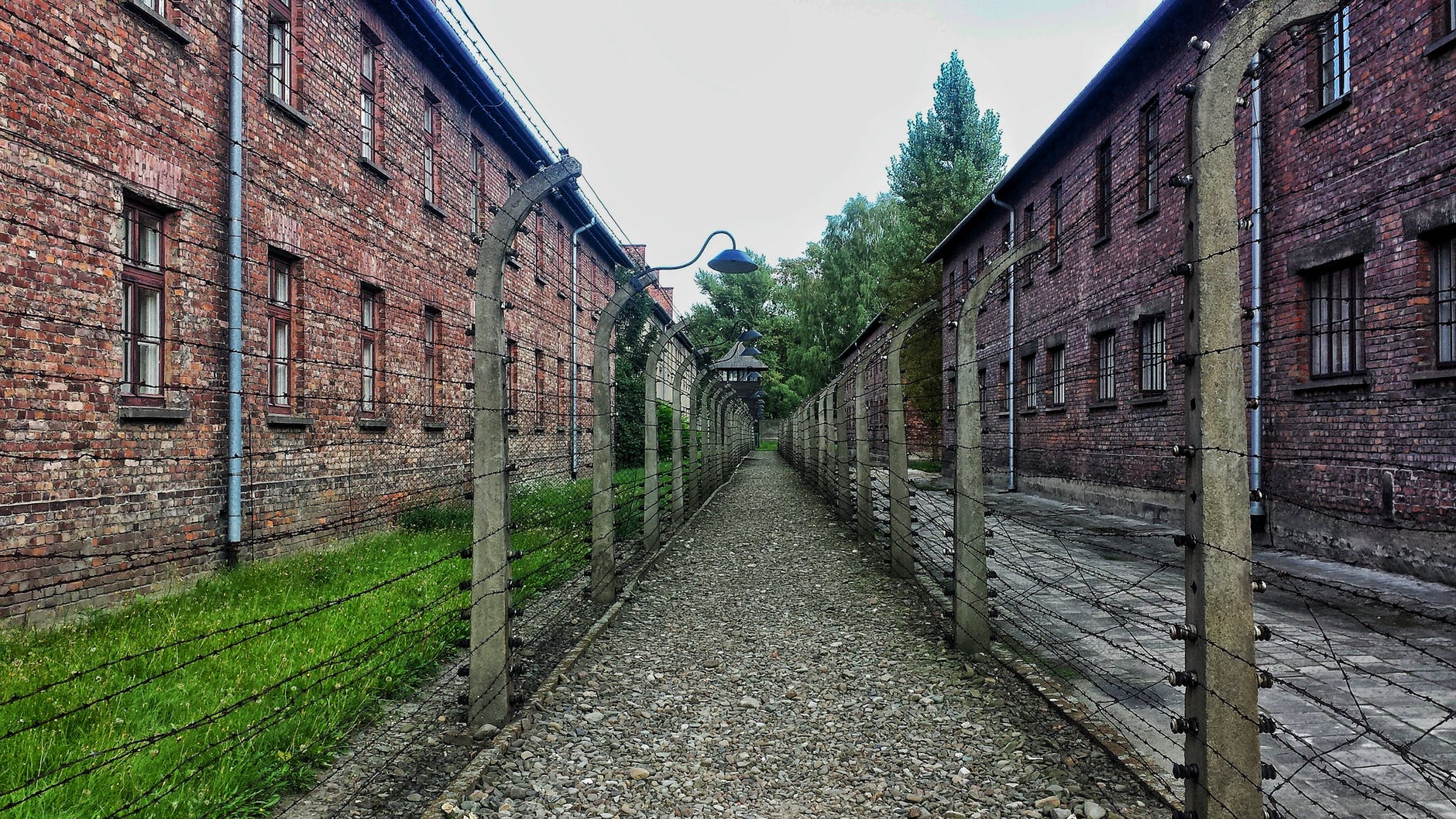A Sneak Peak: A Spirit Broken

Mountains of Hope was a story I wrote in high school during my tenth grade year. It was after extensive research on the subject and remains a story very close to my heart. In it, a young German girl is uprooted when her mother passes away and moved to live with her aunt and uncle. She is isolated and lonely, so takes to exploring the woods behind the house. It is while she is in the woods that a plane carrying American soldiers crashes. Spontaneously, even though she knows the risks, Alexi chooses to hide help the Allies; the bond she forms with these soldiers carries her through as she nurses them to health. Soon, though, she is betrayed. The soldiers scatter and Alexi is turned over, ultimately landing in Auschwitz.
This is part of her experience there; this scene was inspired by a true incident recalled from a Holocaust survivor.
>>>>
Alexi couldn’t think of anything except when her next meal would be. Hunger pangs shot regularly through her stomach, making her feel tired and very weak. Eichman seemed pleased to see that she looked more and more like the other malnourished inmates every day. While she worked, Eichman would come up beside her and talk so quietly into her ear that no one but Alexi could hear. He’d ask her what happened, why wasn’t she working as much vigor as she once had? Where was all that strength? When Alexi would reply that she was afraid she’d lost it, he’d laugh. He’d pull out a long cigarette and light it before he would walk towards the other prisoners. Sometimes she was granted a reprieve: he grew bored of harassing her and moved on to someone else who caught his attention. But no matter how long he stayed away, no matter where he went or how long he ignored her, he always came back. It felt as though she had been singled out as his personal target, though she was sure that that’s exactly what the other women thought as well.
Years later, Alexi would recall how he’d stand behind her and simply stare holes at the back of her head for long periods of time, and she would still feel the fear bumps race over her back and arms. Alexi knew that Eichman and the other guards were aware of how exhausted, malnourished and ill the women were. But instead of taking pity, Eichman gave her a promise: “Is the work too hard? Is it painful? It sure is hot today, isn’t it? Do you want to give up? Do you? If so, all you have to do is lay down your shovel and bow your head. That’s all, and in seconds I’ll have you buried.” At times, Alexi found it a very tempting offer. All she wanted to do, sometimes, was lie down and let him kill her. She was going to die anyway: better sooner than later. But, at the last moment, just before she gave into temptation, an image of one of the soldiers, Tony usually, would cross her mind. What would they think or feel if they somehow learned one day that she’d been killed? Would they think she had courage then? Those thoughts and images gave her the drive to live. Every inmate there had to have some motivation to survive; usually it was to see loved ones again, or sometimes it was revenge or determination, but everyone had something. Alexi had the soldiers.
Still, though, by now the hope that once thrived in the embrace of her heart was long gone. It had been slaughtered not long after her miracle rain. The spirit that had once been so embedded in her character was also gone. She didn’t know who she was anymore: this weak, sick (for it seemed she was always ill with something: fever, chills, nausea), meek person that she’d become was a stranger to her. She had no hopes or dreams any longer; they’d been shattered. All she thought about now was freedom, that elusive dream all prisoners held but which none of them truly believed in anymore.
Although she wanted to believe if for no other reason than to deny the Germans the pleasure of taking her faith away, too, Alexi’s faith in God was tested. Every night, she prayed for comfort and she prayed for strength and liberation—none of which seemed to come. She believed God had left. Liana, as strong as her faith was when Alexi arrived, was also beginning to question God’s existence and was in dire need of reassurance. Alexi wished she did, but she no longer had enough strength to comfort her friend. Nor did she have any reassuring words to offer, even if she’d had the strength. Any words she might have offered—“The Americans are winning the war,” “It will end soon,” “God does hear our prayers”—were all uncertainties, things none of them truly believed anyway. Pretty lies. All feeling—even sympathy for another prisoner—had been numbed.
All feeling, except for one. Even now, when their bodies were skeletal and their hearts numbed to physical pain, the Nazis could still humiliate them. Time had not altered that, nor dulled the scars left by their words or their hands or their batons. Since the murder of the woman who was caught unsuspecting, Alexi had only witnessed one deliberate murder. It too had been at the hands of Eichman, although it began with another officer: Godert.
Godert ordered a new inmate to kneel in front of him and say “Heil Hitler!” The girl lifted her head and looked at him.
“Sir, if you had asked me to kneel and say Heil Satan! himself, I would not be able to do it. Likewise, I cannot and will not do so for Hitler, Satan’s son.”
Godert’s thin eyebrows arched so high on his forehead they nearly disappeared. After a moment, he grinned lopsidedly. The grin gave way to a full-fledged laugh, catching Eichman’s attention. Upon Eichman’s arrival, Godert ordered the girl of seventeen or eighteen years to repeat exactly what she’d just told him. The girl obeyed this time, her body shaking. She knew that she had just signed her own death warrant. But she hadn’t been at the camp even a full day: she didn’t understand how ruthless the Nazis really were. She didn’t understand the full price she’d have to pay for her traitorous comment.
Eichman and Godert ordered the other inmates to stop working and watch. They beat the defenseless, albeit brave, girl within an inch of her life. Blood oozed from cuts on her face, her eyes were swollen nearly shut, her arm was twisted into an unnatural position, and her entire body shook so violently the prisoners who stood several feet away saw it. Once she was beaten and hanging on by a thread, Eichman ordered Godert to step away: he would take it from there, he said. The inmates were forced to watch as he took the butt of his rifle and rammed it, full force, into the girl’s spine. The force of it knocked her face down into the ground. She coughed out the dirt that was pushed into her mouth.
“Stand up,” the Lieutenant ordered.
“Now. Do as Godert ordered you. Get down on your hands and knees and say Heil Hitler! And, Jew, you best be bubbling with enthusiasm.”
“Lieutenant–I…”
He arched his eyebrows and tipped his head to the side, a dangerous glint in his eye warning her to do as directed. There was no way she was going to win this battle.
“If you don’t do it, you’ll just be making this harder on yourself. Now fall to your knees!” he shouted.
Still, the girl stood still, swallowing audibly past the lump that must have been in her throat. As she stood there and waited for what felt like hours, Alexi found herself hoping the girl would merely comply.
“Adolf Hitler,” the girl began softly, “is a man that I will not bow before. He is the sole cause of Germany’s downfall. He is nothing but a murderer. He is not a real Führer, and I will not salute or celebrate him.”
“I wonder if you’d have the audacity to say that to our Führer’s face.”
“Yes, Lieutenant, I would.”
He paused for a moment before he inclined his head. “I’m afraid you’ll not have that chance.”
He inclined his head and Godert, who’d walked to stand behind the girl, kicked her in the lower part of her back. She fell forward, hitting the ground. Eichman walked over and pressed the edge of his boot into the base of her neck. Putting his weight on that foot, he leaned down until he could see the side of her face as she sputtered for air, her palms open flat on the ground. Alexi couldn’t hear what he’d said, until the very end, when he shouted at her. The girl took a deep breath and lifted her eyes to look at him.
Alexi held her breath.
“Who do you think is helping you now? You think Hitler is the downfall of our country? Who’s helping Germany? Hitler is! You are at my mercy, Christ-killer, and you will not insult my Führer! I advise you to obey!”
“My God, the God of Israel, the God of Moses and Abraham, will protect me, even from people like you and Hitler.”
With one clean sweep, Eichman removed his foot from her back, grabbed her around the neck, and threw her over. A second later, the barrel of his rifle was directly against her chin.
“Will He protect you from this?” His finger cocked the gun, and the sound reverberated to every one of the inmates watching, paralyzed by the display of bravery they were seeing. Bravery and brutality. Alexi inhaled sharply, her eyes wide with horror and disbelief. The young martyr, though, showed no fear, except for her eyes, which seemed riveted to the barrel of the gun.
“He may not prevent you from killing me. That is okay. I am prepared to die. But once I am dead, you will have lost because I will not be tortured. I will not be threatened. I will be walking on streets made of gold. I will not have bowed down to Hitler. You will have lost.”
Alexi closed her eyes slowly and exhaled the breath she hadn’t realized she’d been holding. Eichman shook his head violently from one side to the other, almost as though he himself could not believe her audacity, before vigorously pressing the barrel of the gun tighter against her face.
“Heil Hitler!” he demanded.
Ten minutes later, with her face split open with blood and every other place on her body bruised and battered, her arm broken now, Eichman leaned down to her face again, his own face unnaturally red with anger and sweat.
“Praise him or die now!” he shouted.
Tears raced down Alexi’s cheeks. She knew that whatever the girl chose to do now, she was still going to die. Even if she praised Hitler. Somewhere deep inside of her, though, Alexi hoped the girl still possessed enough strength to disobey the lieutenant’s order.
When the girl didn’t respond, Eichman kicked her side and then grabbed a fistful of her shirt. “Do it!” he yelled, anger and frustration evident in his voice.
The girl coughed and then exhaled as she slowly bent her head to the ground. She was so weak that her arms could not support her. She fell face first to the ground. Eichman lifted his baton into the air but before he could use it, she stopped him.
“Heil–Hit–Hitler.”
She spat his name and then gulped in a big breath of oxygen. That one sentence cost the girl her soul, and Alexi knew it by looking at her. But she was only human, and she had taken much more than most could have. Eichman broke her.
